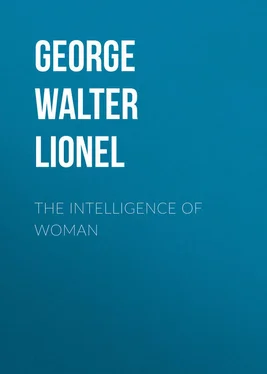Walter George - The Intelligence of Woman
Здесь есть возможность читать онлайн «Walter George - The Intelligence of Woman» — ознакомительный отрывок электронной книги совершенно бесплатно, а после прочтения отрывка купить полную версию. В некоторых случаях можно слушать аудио, скачать через торрент в формате fb2 и присутствует краткое содержание. Жанр: foreign_antique, foreign_prose, на английском языке. Описание произведения, (предисловие) а так же отзывы посетителей доступны на портале библиотеки ЛибКат.
- Название:The Intelligence of Woman
- Автор:
- Жанр:
- Год:неизвестен
- ISBN:нет данных
- Рейтинг книги:4 / 5. Голосов: 1
-
Избранное:Добавить в избранное
- Отзывы:
-
Ваша оценка:
- 80
- 1
- 2
- 3
- 4
- 5
The Intelligence of Woman: краткое содержание, описание и аннотация
Предлагаем к чтению аннотацию, описание, краткое содержание или предисловие (зависит от того, что написал сам автор книги «The Intelligence of Woman»). Если вы не нашли необходимую информацию о книге — напишите в комментариях, мы постараемся отыскать её.
The Intelligence of Woman — читать онлайн ознакомительный отрывок
Ниже представлен текст книги, разбитый по страницам. Система сохранения места последней прочитанной страницы, позволяет с удобством читать онлайн бесплатно книгу «The Intelligence of Woman», без необходимости каждый раз заново искать на чём Вы остановились. Поставьте закладку, и сможете в любой момент перейти на страницу, на которой закончили чтение.
Интервал:
Закладка:
Here is a typical masculine attitude, that of Mr. George Moore, in A Modern Lover . Mr. George Moore, who seems to know a great deal about females but less about women, causes in this book Harding, the novelist, who generally expresses him, to criticize George Sand, George Eliot, and Rosa Bonheur: "If they have created anything new, how is it that their art is exactly like our own? I defy any one to say that George Eliot's novels are a woman's writing, or that The Horse Fair was not painted by a man. I defy you to show me a trace of feminality in anything they ever did; that is the point I raise. I say that women as yet have not been able to transfuse into art a trace of their sex; in other words, unable to assume a point of view of their own, they have adopted ours."
This is cool! I have read a great deal of Mr. George Moore's art criticism: when it deals with the work of a man he never seeks the masculine touch. He judges a man's work as art; he will not judge a woman's work as art. He starts from the assumption that man's art is art, while woman's art is – well, woman's art. That is the sort of thing which has discouraged woman; that is the atmosphere of tolerance and good-conduct prizes which she has breathed, and that is the stifling stupidity through which she is breaking. She will break through, for I believe that she loves the arts better than does man. She is better ground for the development of a great artist, for she approaches art with sympathy, while the great bulk of men approach it with fear and dislike, shrinking from the idea that it may disturb their self-complacency. The prejudice goes so far that, while women are attracted to artists as lovers, men are generally afraid of women who practice the arts, or they dislike them. It is not a question of sex; it is a question of art. All that is part of sexual heredity, of which I must say a few words.
But, before doing so, let me waste a few lines on the male conception of love, which has influenced woman because love is still her chief business. To this day, though it dies slowly, the male attitude is still the attitude to a toy. It is the attitude of Nietzsche when saying, "Man is for war, woman for the recreation of the warrior." This idea is so prevalent that Great Britain, in its alleged struggle against Nietzschean ideas, is making abundant use of the Nietzschean point of view. No wonder, for the idea runs not only through men but through Englishmen: "woman is the reward of war," – that is a prevalent idea, notably among men who make war in the neighborhood of waste-paper baskets. It has been exemplified by the British war propaganda in every newspaper and in every music hall, begging women to refuse to be seen with a man unless he is in khaki. It has had government recognition in the shape of recruiting posters, asking women "whether their best boy is in khaki." It has been popularly formulated on picture postcards touchingly inscribed, "No gun, no girl."
All that – woman as the prize (a theory repudiated in the case of Belgian atrocities) – is an idea deeply rooted in man. In the eighteen-sixties the customary proposal was, "Will you be mine?" Very faintly signs are showing that men will yet say, "May I be yours?" It will take time, for the possessive, the dominating instinct in man, is still strong; and long may it live, for that is the vigor of the race. Only we do not want that instinct to carry man away, any more than we want a well-bred horse to clench its teeth upon the bit and bolt.
We want to do everything we can to get rid of what may be called the creed of the man of the world, which is suggested as repulsively as anywhere in Mr. Rudyard Kipling's Departmental Ditties :
"My Son, if a maiden deny thee and scufflingly bid thee give o'er,
Yet lip meets with lip at the lastward – get out! She has been there before.
They are pecked on the ear and the chin and the nose who are lacking in lore.
"Pleasant the snaffle of Courtship, improving the manners and carriage;
But the colt who is wise will abstain from the terrible thornbit of Marriage.
Blister we not for bursati ? So when the heart is vext,
The pain of one maiden's refusal is drowned in the pain of the next."
There is a great deal of this sort of thing in Molière, in Thackeray, in Casanova. The old idea of woman eluding and lying; of woman stigmatized if she has "been there before", while man may brag of having "been there before" as often as possible; of man lovelacing for his credit's sake and woman adventuring at her peril.
8
I submit that each man and woman has two heredities: one the ordinary heredity from two parents and their forbears, the other more complex and purely mental – the tradition of sex. Heredity through sex may be defined as the resultant of consecutive environments. I mean that a woman, for instance, is considerably influenced by the ideas and attitudes of her mother, grandmothers, and all female ascendants. They had a tradition, and it is the basis of her outlook. Any boy born in a slum can, as he grows educated, realize that the world lies before him; literature and history soon show him that many as lowly as he have risen to fame, as artists, scientists, statesmen; he may even dream of becoming a king, like Bonaparte. To the boy nothing is impossible; if he is brave, there is nothing he may not tear from the world. He knows it, and it strengthens him; it gives him confidence. What his fathers did, he may do; the male sexual heredity is a proud heritage, and only yesterday a man said to me, "Thank God, I am a man." Contrast with this the corresponding type of heredity in woman. Woman carries in her the slave tradition of her maternal forbears, of people who never did anything because they were never allowed to; who were told that they could do nothing but please, until they at last believed it, until by believing they lost the power of action; who were never taught, and because uneducated were ashamed; who were never helped to understand the work of the world, political, financial, scientific, and, therefore, grew to believe that such realms were not for them. I need not labor the comparison: obviously any woman, inspired by centuries of dependence, instinctively feels that, while everything is open to man, very little is open to her. She comes into the arena with a leaden sword; in most cases she hardly has energy to struggle.
A little while ago, when Britain was floating a large war loan, one woman told me that she could not understand its terms. We went into them together, and she found that she understood perfectly. She was surprised. She had always assumed that she did not understand finance, and the assumption had kept her down, prevented her from understanding it. Likewise, and until they try, many women think they cannot read maps and time-tables.
With that heredity environment has coalesced, and I think no one will deny that a continuous suggestion of helplessness and mental inferiority must affect woman. It means most during youth, when one is easily snubbed, when one looks up to one's elders. By the time one has found out one's elders, it is generally too late; the imprint is made, and woman, looking upon herself as inferior, hands on to her daughters the old slavery that was in her forbears' blood. To me this seems foolish, and during the past thirty or forty years a great many have come to think so too; they have shown it by opening wide to woman the doors of colleges, many occupations and professions. Many are to-day impatient because woman has not done enough, has not justified this new freedom. I think they are unjust; they do not understand that a generation of training and of relative liberty is not enough to undo evils neolithic in origin. All that we are doing to-day by opening gates to women is to counter-influence the old tradition, to implant in the woman of to-morrow the new faith that nothing is beyond her powers. It lies with the woman of to-day to make that faith so strong as to move mountains. I think she will succeed, for I doubt whether any mental power is inherent in sex. There are differences of degree, differences of quality; but I suspect that they are mainly due to sexual heredity, to environment, to suggestion, and that indeed, if I may trench upon biology, human creatures are never entirely male or entirely female; there are no men, there are no women, but only sexual majorities.
Читать дальшеИнтервал:
Закладка:
Похожие книги на «The Intelligence of Woman»
Представляем Вашему вниманию похожие книги на «The Intelligence of Woman» списком для выбора. Мы отобрали схожую по названию и смыслу литературу в надежде предоставить читателям больше вариантов отыскать новые, интересные, ещё непрочитанные произведения.
Обсуждение, отзывы о книге «The Intelligence of Woman» и просто собственные мнения читателей. Оставьте ваши комментарии, напишите, что Вы думаете о произведении, его смысле или главных героях. Укажите что конкретно понравилось, а что нет, и почему Вы так считаете.












